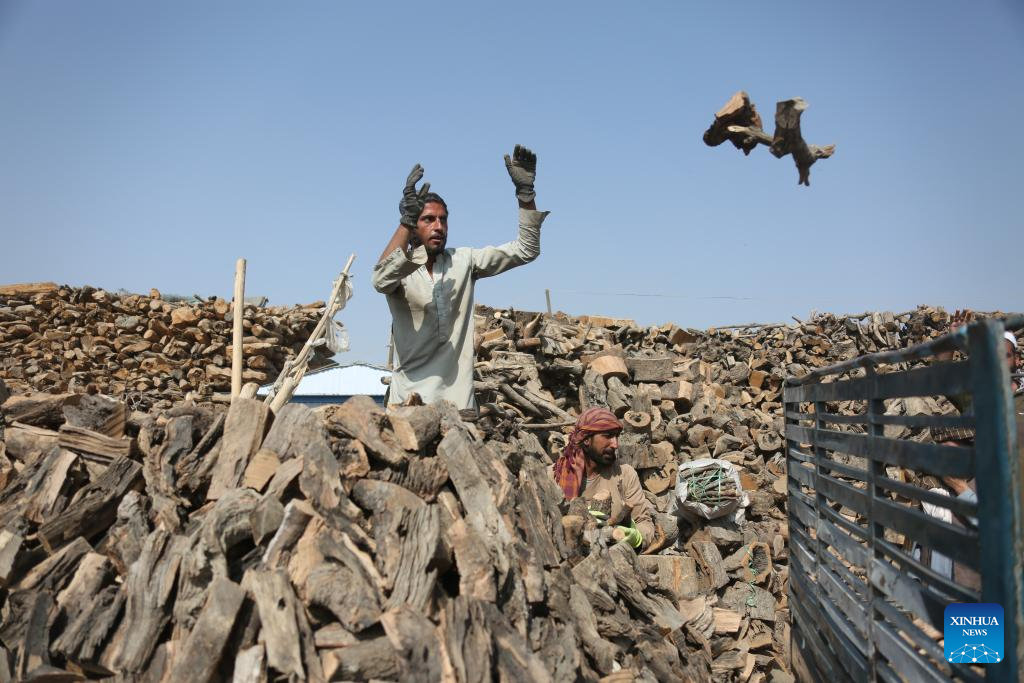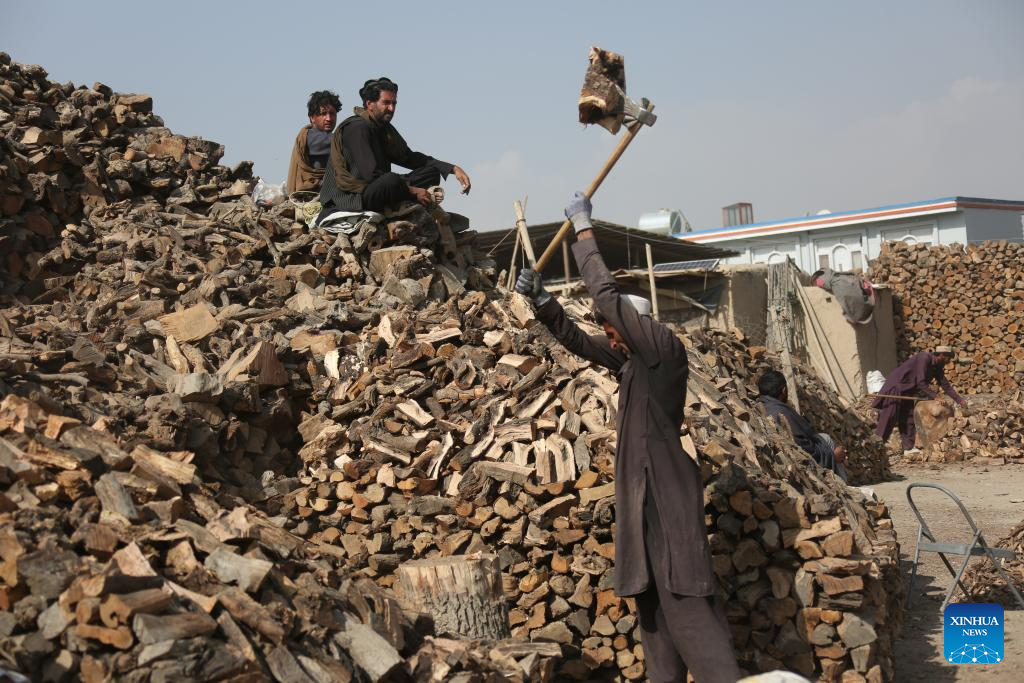Feature: Economic hardship leaves Afghans struggling to heat their homes this winter
Source: Xinhua
Editor: huaxia
2025-10-24 14:12:45

An Afghan worker loads wood at a firewood shop in Kabul, Afghanistan, Oct. 21, 2025. (Photo by Saifurahman Safi/Xinhua)
KABUL, Oct. 24 (Xinhua) -- As biting winter winds descend upon war-torn, mountainous Afghanistan, Mohammad Aleem, a frail elderly man from Kabul, trudges wearily to the firewood market, his annual ritual now shadowed by deepening despair.
Bargaining fiercely for 1,100 kg of wood to fend off the merciless cold, he laments the nation's crumbling economy, his voice trembling with frustration and quiet rage. "All people are impoverished, the economy is very weak," he said.
At 70, Aleem makes this pilgrimage each year, clutching his meager savings to stockpile enough firewood for his modest home. He points to the desperate measures many have resorted to, burning plastic and old tires in makeshift stoves, filling the air with toxic smoke that clings to food and lungs alike. "This smoke pollutes the environment, affects food and bread, and harms our health. We should not use plastic," Aleem told Xinhua.
In Afghanistan, firewood is procured by the "Kharwar," a traditional unit equivalent to 560 kg. This season, high-quality firewood commands a price range of 11,500 to 12,000 afghanis per Kharwar, about 172 to 180 U.S. dollars, a modest increase on paper that feels insurmountable to the destitute.
Nemat Khan, a weathered firewood seller with calloused hands from decades in the trade, surveyed his dwindling stock with a heavy sigh. "The market this year is worse than in previous years," he said, attributing the slump to widespread poverty and joblessness.
Families who once bought premium wood at 11,000 to 12,000 afghanis now scavenge for cheaper bundles at 6,000 to 6,500 afghanis. "People are poor and destitute, their economy is zero," Khan added with quiet empathy. He remembered busier days when laughter punctuated deals now replaced by silence and whispered pleas for discounts.
Among those hardest hit is Mamoor Muzlomyar, a rickshaw driver who pedals from dawn to dusk on a creaking three-wheeler, struggling to earn enough for winter fuel. "There are many problems, little work and very high firewood prices. No one can afford to buy wood," Muzlomyar lamented.
Prices have surged while opportunities have vanished. "There are no jobs to earn money and buy wood," he told Xinhua, his exhaustion mirroring the fatigue of an entire nation.
In a country where central heating is a rare luxury, even in major cities like Kabul, traditional stoves remain the lifeline, devouring wood that families can scarcely afford.
In parallel, authorities in Afghanistan are undertaking comprehensive surveys and preparatory measures to assist vulnerable households across the country's most remote and inhospitable, frigid regions.
Yousef Hamad, spokesperson for the National Disaster Management Authority, highlighted ongoing efforts to assess and address the needs of the most vulnerable. "In collaboration with various institutions and organizations, we have launched surveys across multiple provinces to identify those in dire need," Hamad told Xinhua.
"Pursuing these assessments, we will distribute cash and food assistance to provinces hardest hit by cold weather, prioritizing regions where extreme poverty exacerbates the impact of harsh conditions." Hamad underscored the commitment to swift action, stating, "Our department, in partnership with aid organizations, is dedicated to delivering immediate relief to ensure no community is left unprotected."
Afghanistan's winters have always been unforgiving, with temperatures plunging below freezing in Kabul and snow blanketing the rugged highlands. But since the 2021 economic collapse, compounded by sanctions, aid cuts, and ongoing internal strife, survival has grown even harsher.
Abdul Rahman Habib, spokesperson for the Ministry of Economy, emphasized that relevant ministries and agencies are leveraging available resources to bolster food security and provide urgent assistance.
Support programs have been implemented to ensure adequate food and fuel supplies while stabilizing market prices. These measures aim to fortify communities against the challenges of winter, ensuring access to essential resources, Habib said.
Unemployment soars, inflation erodes what little savings remain, and more than half the population now faces acute food insecurity, according to humanitarian organizations.
The stories of Aleem, Khan, and Muzlomyar are more than snapshots of a struggling market, they are a reminder of the human face behind every kilogram of firewood and every puff of smoke. As the cold season tightens its grip, how will a community already stretched thin find the warmth it needs without sacrificing its health or its future? ■

An Afghan worker chops wood at a firewood shop in Kabul, Afghanistan, Oct. 21, 2025. (Photo by Saifurahman Safi/Xinhua)



